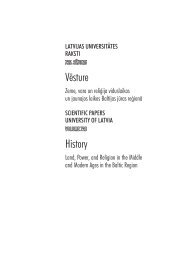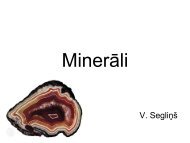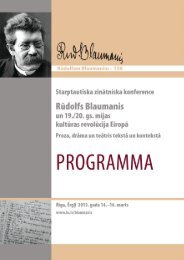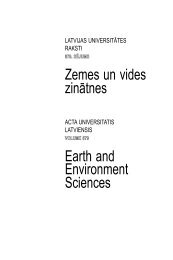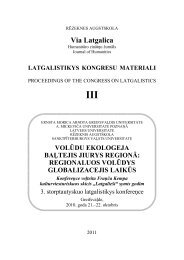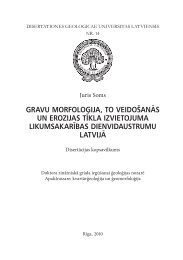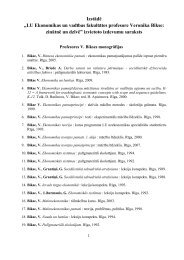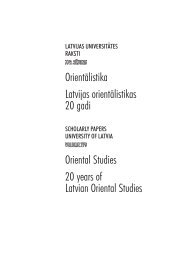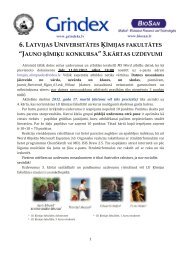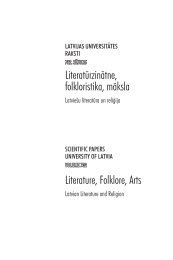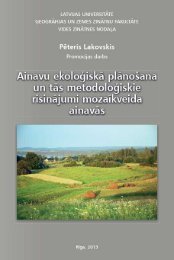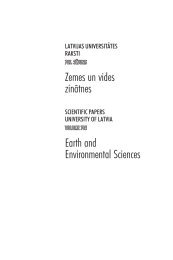Untitled
Untitled
Untitled
You also want an ePaper? Increase the reach of your titles
YUMPU automatically turns print PDFs into web optimized ePapers that Google loves.
208 LITERATÛRZINÂTNE, FOLKLORISTIKA, MÂKSLA<br />
world of Mankind, is sunk into Night” and, consequently, “We are all in the Dark,<br />
one with another” 16 .<br />
Thus, Dyer dismisses “the narrow Conceptions of this Generation of Writers who<br />
speak with Sir Chris. of a new Restauration of Learning, and who prattle something<br />
too idly on the new Philosophy of Experiment and Demonstration: these are but poor<br />
Particles of Dust which will not burie the Serpents”. 17 The new experimental method<br />
will not and cannot put an end to man’s irrational desires, nor will it satisfy man’s<br />
yearning for the bizarre, exotic, unusual, mysterious, supernatural, inexplicable in<br />
terms of a materialistic and mechanistic philosophy. Dyer calls the new philosophy<br />
“fantasticall and perishable Trash” 18 .<br />
According to Locke the mind is a blank sheet (tabula rasa) on which physical<br />
objects make their imprints. It is a receptacle for sensory inputs from the external<br />
world19 . For Wren perception is a simple contact of the mind with an external object,<br />
whereas for Dyer perception is inseparably linked with emotions, imagination and<br />
memory. For Dyer Stonehenge is a monument to Eternity impervious to the destructive<br />
passage of time, a place of worship full of mystery and enchantment, possessing<br />
the power to have a great impact upon man’s psyche. For Dyer visiting Stonehenge<br />
is an awe–inspiring, mystical experience. He “was struck by an exstatic Reverie” 20 .<br />
He calls it a “huge and monstrous Work” 21 and sees its elements as “Men<br />
metamorphosised into Stone” 22 . In contrast, the only thing that Wren is interested in<br />
when visiting Stonehenge is the geometric and mathematical properties of the place.<br />
He is fascinated by its beautiful proportions. Wren sees Stonehenge simply as an<br />
architectural monument designed according to the laws of mathematics and mechanics.<br />
Dyer’s perceptions of Stonehenge are interconnected and filled with the images<br />
of his imagination. As he leans against the stones he can perceive not only their cold<br />
surface but also “the Labour and Agonie of those who erected it, the power of Him<br />
who enthrall’d them, and the marks of Eternity which had been placed there” 23 . Also,<br />
he could hear their “Cryes and Voices” 24 .<br />
We see, thus, that Dyer’s perceptions of external objects are inextricably interconnected<br />
with his emotions and with the images of the imagination, completing and enriching<br />
each other 25 . In Wren’s mind, however, perceptions are dissociated from the imagination<br />
and memory. Wren talks about Stonehenge solely in terms of its proportions and<br />
other mathematical properties. In contrast, Dyer contemplates its mystical aspects. He<br />
feels, hears and sees the ancient builders of Stonehenge. While Wren’s perceptions are<br />
subjected to the scrutiny of reason, Dyer’s perceptions immediately evoke intense emotions<br />
in his soul and provoke the working of his imagination.<br />
Similarly, Wren’s and Dyer’s perceptions of an autopsy are very different. Dyer<br />
contrasts the story of the flagellant, who scourged himself for his sins to relieve his<br />
torment and anguish, with the story of Sir Chris., who besmeared himself with blood<br />
when dissecting a woman’s corpse to satisfy his curiosity. Wren’s speech when he is<br />
preparing to dissect and examine the corpse is interspersed with Dyer’s extremely rude<br />
and anguished remarks. Dyer is disgusted by Wren’s disquisition on human anatomy<br />
because for Wren “the Body it self is a perfect peece of Work from the Hand of the<br />
Omniscient Architect” 26 and the bodily processes simply “the Union and Dissolution<br />
of little Bodies or Particles” 27 . Dyer believes that “The meerest Rake–hell has a



